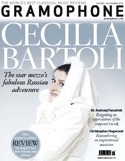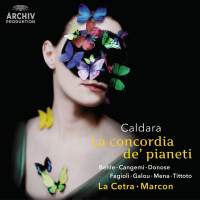Texte paru dans: / Appeared in: |
|
|
Reviewer:
David
Vickers On November 19, 1723, Emperor Charles VI and his empress Elisabeth stayed at Znojmo Castle in southern Moravia where Caldara’s serenata La concordia de’ pianeti was performed outdoors to celebrate the empress’s name day. The one-act libretto by the imperial court poet Pietro Pariati is a static paean that depicts the harmonious planets marvelling to each other at the glorious beauty, wisdom and virtue of the empress ‘Elisa’.
Recorded
across several days of sessions either side of a concert performance in
Dortmund, I’m not sure why the producer decided to edit in loud audience
applause from the concert in advance of the performance, but La Cetra’s relaxed
trumpet flourishes, nonchalant rhythmical inégales and timely thundering timpani
during the Introduzione instantly establish the attractiveness of Caldara’s
music. Daniel Behle navigates the tricky lines of Mercury’s animated ‘Tal se
gemma e rara e bella’ with composure, and Veronica Cangemi is on fine form in
Diana’s ‘Ad essa io cederò’, which praises the empress effusively but actually
sounds rather like an operatic evocation of jealousy; its overlapping strings
and lilting rhythms remind us that Caldara’s Venetian roots are not so far away
from those of his compatriot Vivaldi. Franco Fagioli’s firm projective technique
is displayed in Apollo’s ‘Questo dì così giocondo’, whereas his cleaner-toned
colleague Carlos Mena is not entirely at home in Mars’s most stretched passages
of coloratura. Additional instruments are utilised sparingly: oboes and bassoons
sparkle playfully in Jupiter’s ‘Alla bontade e al merto’ (sung elegantly by
Ruxandra Donose); Venus’s ‘Ad Elisa ancor d’intorno’ has cello and plucked
continuo providing a fandango-like accompaniment to Delphine Galou’s polished
singing; Mars’s ‘Da mia tromba’ features limpid solo trumpet; and a chortling
bassoon contributes to Saturn’s ‘Pari a quella il mondo vede’, in which resonant
bass Luca Tittoto compares Elisa’s modesty, virtue and beauty to that of her
daughters. There might be more engrossing works than this one that still await
rediscovery but there’s no disputing the qualities of Andrea Marcon’s crisply
directed performance. |
|
|
|
|
|
Cliquez l'un ou l'autre
bouton pour découvrir bien d'autres critiques de CD |
|




